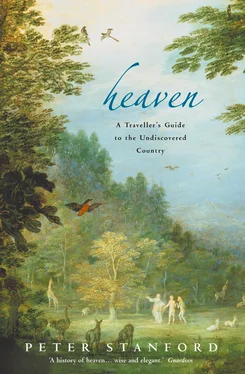With no precise location of this heaven ‘in the air’ and ‘in the clouds’ mentioned elsewhere, Paul might well have been speaking metaphorically, but both the apostle and Jesus were utterly at one in emphasising the central importance of being with God in heaven and in dismissing Jewish hopes for an earthly messianic kingdom. From the perspective of earth, Paul wrote in one of his best-known phrases that we can only imagine meeting God as ‘we see through a glass, darkly’. However, he gave the theocentric line an imaginative new gloss: God’s kingdom, he argued, was already here in one form because Christ was everywhere where people worshipped him and praised him. (This interpretation may indeed be what the author of Luke is driving at when he has Jesus speak of the ‘God of the living’.) Heaven, by contrast, would bear little resemblance to this life because, according to Paul, our resurrected bodies would not be our earthly ones.
For we know that when the tent that we live in on earth is folded up, there is a house built by God for us, an everlasting home not made by human hands, in the heavens. In this present state, it is true, we groan as we wait with longing to put on our heavenly home over the other; we should like to be found wearing clothes and not be without them. Yes, we groan and find it a burden being still in this tent, not that we want to strip it off, but to put on the second garment over it and to have what must die taken up into life … we remember that to live in the body means to be exiled from the Lord. (2 Cor 5:1–7)
The Acts of the Apostles tells us that Paul was a tent-maker by trade, so the metaphor he uses is apt. The separation of body and soul was, as we have already seen, a distinctly Greek idea, especially in the hands of Plato, and Paul knew Greek as well as any of the early Christian leaders. His talk, of a ‘spiritual body’, however, was never precise or well-defined. And his insistence that ‘flesh and blood cannot inherit the kingdom’ (1 Cor 15:50) was strangely at odds with his focus on the image of the risen Christ – who ascended to heaven body and soul.
Indeed there is a good deal of confusion in Paul’s writings, for two verses further on, he states that the dead would be raised ‘imperishable … because our present perishable nature must put on imperishability’. This sounds suspiciously like bodily resurrection. Paul may have spoken Greek, have read Plato, and been influenced by him on the separation of body and soul, but he was also a Jew and Jews did not split up humanity in this fashion. Some argue that the distinction he was making was between ‘flesh’ ( sarx ), by which he meant the whole human being, body and soul, turned away from God, and ‘spirit’ ( pneuma ) the whole human being, body and soul, turned towards God.
‘Conceivably, had Paul known about atoms and molecules,’ writes E. P. Sanders, the American religious historian and admirer of Paul, ‘he would have put all this in different terms. What he is affirming and denying is clear: resurrection means transformed body, not walking corpse or disembodied spirit. We can hardly criticise him for not being able to define “spiritual body” more clearly. His information on the topic was almost certainly derived entirely from his experience of encountering the risen Lord.’
In spiritual man, then, Paul could have been suggesting an entirely new kind of human being, for whom there were no adequate words, essentially a transcendent being. Such a radical thought could then be placed alongside Paul’s habit of invoking other notions similarly revolutionary (for his time) – namely that there were no divisions between men and women, slave or freeman, Jew or Gentile.
The same might be said about the passage in his Second Letter to the Corinthians which links in closely with this line of thought. Here Paul wrote of a man (taken by many to be a thinly veiled reference to Paul himself) who ‘was caught up into paradise’ where he ‘heard things which must not and cannot be put into human language’ and therefore about which he refused to speak when he returned to earth. One approach would be to deduce that here Paul was offering an early hint of what came to be called ‘Jewish Throne Mysticism’. This entailed an inward trip, rather like the Buddhist search for nirvana, but done in the form of a symbolic ascent to a place of greater knowledge undertaken within this life. Paul was then encountering heaven, or salvation, but doing so within himself in a mystical form, a theory not wholly inconsistent with the ideas found in the Paulian writing we have already looked at.
Mysticism has traditionally been a difficult concept for the monotheistic creeds to cope with because it cuts against their practical, naturalistic, action-reward philosophies and their taste for the literal. Yet it is ever-present in the history of heaven down the ages. Derived from the Greek verb musteion , meaning to close the eyes or mouth, mysticism generally refers to an experience of darkness or silence. It has been one of the main ways in which various religious traditions have attempted to explain the inner world of the psyche and the imagination in relation to a deity, and it has obvious parallels with modern-day psychoanalysis.
In the second and third centuries Judaism developed a strong and well-recorded mystical bent as a way of turning away from external realities of political persecution towards a more powerful internalised divine realm. This may already have been around in Paul’s time. The throne of God in this strand of theology was approached via an often terrifying but explicitly imaginary, inward journey through seven heavens. Throne Mysticism thrived within Judaism and even inside the great rabbinic academies until it was overtaken by a new form of mysticism, Kabbalah, in the twelfth century. Karen Armstrong places it in a wider context which links Judaism with other belief systems.
The visions are not ends in themselves, but means to an ineffable religious experience that exceeds normal concepts. They will be conditioned by the particular religious tradition of the mystic. A Jewish visionary will see visions of the seven heavens because his religious imagination is stocked with these particular symbols. Buddhists see various images of Buddhas … Christians visualise the Virgin Mary. It is a mistake for the visionary to see these mental apparitions as objective or as anything more than a symbol of transcendence. Since hallucination is often a pathological state, considerable skill and mental balance is required to handle and interpret the symbols that emerge during the course of concentrated meditation and inner reflection.
(from A History of God )
Hence, arguably, St Paul’s reticence and refusal to go into detail. His experience had frightened him. However, the episode potentially offers a bridge between Judeo-Christian images of heaven and Eastern concepts of nirvana. Moreover, it brings monotheism and pantheism closer together. Islam too, as we shall see, had a similar tradition with Muhammad ascending symbolically to heaven where he saw and yet did not see the divine presence. That final lack of precision is key to identifying Throne Mysticism. The author must struggle but fail to find the right words, whether it be because they are unsure about what exactly they are seeing, or whether, like St Paul, they simply refuse to go into detail.
On another level, Jewish Throne Mysticism links the outward search for a blueprint of heaven with an acknowledgement that afterlife can only ever, for the living, be an imaginary thing, a type of contemplative experience. This is an important thought to keep in mind when examining the final book of the Bible, Revelation. The traditional view is that Revelation was written by the apostle John in the closing years of the first century, when he had been exiled to the Greek island of Patmos. As a source of inspiration to a Christian church then being persecuted by the Romans, he sent out a vision of the final victory of God to the seven churches of Asia. The basis of this judgement is not obvious from the text, religious scholars point out, and the only consensus is that the author was a person called John who considered himself called to be a prophet. Arguably the Bible’s only thorough-going apocalyptic text, Revelation postdated both Paul and the Gospels, and its picture of heaven is clearly governed more by political realities of the time than by any pure or philosophical vision of paradise. Heaven is described in such a way as to cast a poor light on the fate of the late first-century Israel and to mark a stark contrast with the Roman world. If it was composed, as has been suggested, during the persecution of Domitian (AD 51–96), then the terrible fate of the damned towards the end of the book could be read as a quite unholy fantasy about what Christians would like to do to their persecutors if they ever got the chance.
Читать дальше












